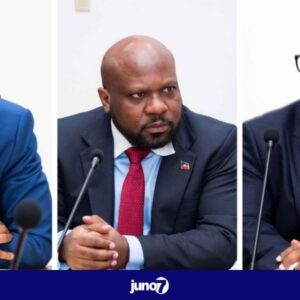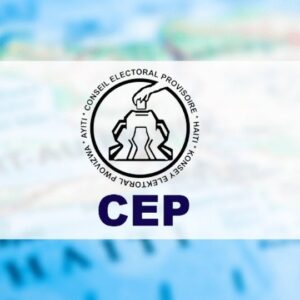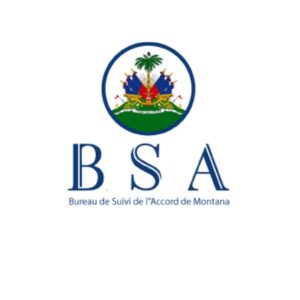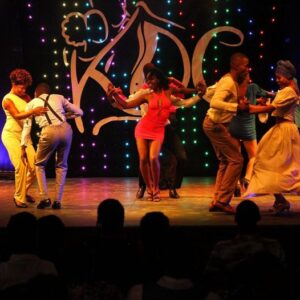Draft-Decree / Draft-Decree
FRAMEWORK DOCUMENT FOR THE CREATION, ORGANIZATION AND FUNCTIONING OF THE PRESIDENTIAL COUNCIL
I. THE CONSTITUTION AND EXERCISE OF EXECUTIVE POWER DURING THE INTERIM PERIOD
Section A
On the exercise of executive power
Article 1: The transitional executive power is exercised by:
a) The Presidential Council of the Transition;
b) The Transitional Government headed by the Prime Minister.
Section B
The mission and composition of the Presidential Council
Article 2: The Presidential Council assumes the presidency of the Transition. It is made up of nine (9) advisors, including seven members designated by the following entities:
Agreement of August 30, 2021, also known as the Montana Agreement; Collective of political parties of January 30, 2023; Agreement of December 21, 2022; Lavalas Family Party; Democratic Resistance Platform (RED/EDE) and the Historical Compromise political grouping; Desalin’s Son Party; Private sector. Two observers, without voting rights, are designated by the following entities:
Civil society ; REN/Inter-foi. II. OF THE PRESIDENCY OF THE COUNCIL
Article 3: The members of the Presidential Council proceed, after their installation, to the election of the President of the Council by simple majority. In the event of a tie, a second ballot is organized. If a tie persists, the President is chosen by drawing lots from among the two candidates in the running.
Article 3.1: To be elected President of the Presidential Council, in accordance with article 135.1 of the 1987 Constitution, it is necessary:
To be of Haitian nationality of origin, to have never renounced their Haitian nationality and to not hold any other nationality at the time of the installation of the Presidential Council (CP); To have reached the age of thirty-five (35) years. enjoy their civil and political rights and have never been sentenced to a punishing and infamous sentence for a common law crime; be the owner in Haiti of at least one building and have a habitual residence in the country; have resided in the country for five (5) consecutive years before the date of installation of the Presidential Council (CP); commit not to be a candidate in the next elections. Article 3.2: The two observer members of the Presidential Council organize the election of the President of said Council and examine the eligibility of the candidates.
Article 3.3: The President of the Presidential Council is the nominal Head of the Armed Forces, but he never personally commands them. However, decisions relating to the Armed Forces are taken collectively as indicated in article 5 below.
Article 3.4: The President of the Presidential Council, accompanied by the other members of the said Council, chairs the Council of Ministers.
III. The entry into office of members of the Presidential Council
Article 4: Before taking office, each member of the Presidential Council takes the following oath: “I swear, before God and before the Nation, to faithfully observe the Constitution and the laws of the Republic, to respect and respect the rights of the Haitian people, to work for the greatness of the Homeland, to maintain national independence and territorial integrity. »
IV. On the organization of the Presidential Council
Article 5: The Presidential Council is organized as follows:
The Presidency of the Presidential Council; The sectoral cabinets of the council are each coordinated by an Advisor-President and distributed according to the following six major projects: security, elections, constitutional reform, the sovereign national conference, economic recovery and social and humanitarian recovery. Article 5.1: The missions and modes of operation of the sectoral cabinets of the Council will be defined by order of the Presidential Council taken in the Council of Ministers.
V. Responsibilities of the Presidential Council
Article 6: The Presidential Council ensures compliance and execution of the Constitution, in all its articles applicable to the specific period of the Transition and to the laws of the Republic. It ensures the stability of institutions and ensures regular functioning.
Article 6.1: The Presidential Council chooses the Head of Government. The Prime Minister, in consultation with the Presidential Council, forms the ministerial cabinet.
Article 6.2: Each sector represented within the Presidential Council proposes a candidate for the position of Prime Minister, then submitted to the vote of the Presidential Council. The latter chooses the Prime Minister by absolute majority vote. In the event of a tie, additional rounds of voting are held. If the tie persists, the Prime Minister is chosen by drawing lots.
Article 6.3: The Presidential Council ensures that the Head of Government and the selected ministers meet the following criteria:
Be of Haitian nationality and not have renounced this nationality; Enjoy their civil and political rights and have never been sentenced to an infamous sentence; Own property in Haiti or practice a profession there; Residing in the country for five (5) consecutive years; Obtain a favorable management report from the Superior Court of Auditors and Administrative Litigation in the event of management of public funds. Article 7: The Presidential Council may dismiss the Head of Government in the event of resignation of the latter, serious presumptions of duly established criminal acts or corruption, or upon presentation of documented evidence of lack of governance by the OCAG.
Article 8: The Presidential Council guarantees National Independence and Territorial Integrity.
Article 9: The Presidential Council is responsible for the negotiation and signing of all treaties, conventions and international agreements signed by the President of the Council.
Article 10: The Presidential Council accredits Ambassadors and Extraordinary Envoys to foreign powers, receives letters of credence from Ambassadors of foreign powers and grants exequatur to Consuls.
Article 11: The Presidential Council has the power to declare war, negotiate and sign peace treaties with the validation of the Council of Ministers.
Article 12: The Presidential Council appoints, by decree taken in the Council of Ministers, the Commander-in-Chief of the Armed Forces, the Commander-in-Chief of the Police, the Ambassadors and the Consuls General.
Article 13: The Presidential Council appoints, by decree taken in the Council of Ministers, the directors general of public administration, the delegates and vice-delegates of departments and districts, as well as the councils of temporary agents of municipalities and municipal sections . He is also responsible for appointing the boards of directors of autonomous organizations.
Article 14: The Presidential Council makes the following appointments: the Provisional Electoral Council composed of nine members, in accordance with the criteria set out in article 289 of the 1987 Constitution; the Steering Committee of the National Conference on the proposal of the Prime Minister; the Commission for Constitutional Reform and the Truth and Justice Commission on the proposal of the Prime Minister and in consultation with national and international human rights organizations.
Article 15: The Presidential Council seals the decrees with the Seal of the Republic and promulgates them within the time limits prescribed by the Constitution.
Article 16: The Presidential Council ensures the execution of judicial decisions in accordance with the law.
Article 17: All presidential powers not specified in this decree are exercised by a simple majority by the members of the Presidential Council.
VI. How the Council works
Article 18: The Presidential Council has its headquarters at the National Palace.
Article 18.1: The decisions of the Presidential Council of the Transition are taken by consensus or, failing that, by majority vote on the basis of one member, one vote.
Article 18.2: In the event of a tie of votes following an absence or abstention, the President’s vote counts double.
Article 18.3: In the event of a vote, reservations or positions are recorded in the minutes.
Article 18.4: The Presidential Council takes valid decisions at its meetings if at least four (4) of its voting members are present, ensuring that all members have been duly notified of the meeting.
Article 18.5: In the event of a duly justified absence, a member of the Presidential Council may delegate his right to vote to a colleague.
Article 18.6: In the event of incapacity or death of a member of the Presidential Council, the original structure replaces him within 10 days following the case.








